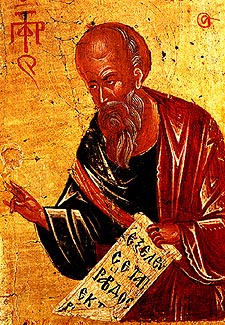|
|||
|---|---|---|---|
| This weekly bulletin insert complements the curriculum published by the Department of Christian Education of the Orthodox Church in America. This and many other Christian Education resources are available at http://dce.oca.org. | |||

Elisha was a prophet of the Northern Kingdom of Israel. He was the son of a farmer, called to his vocation while he was plowing a field "with twelve yoke of oxen before him" (I Kings 19: 19). Elijah, the senior prophet commanded by God to seek him out, cast his mantle on Elisha, who ran after him and promised to follow him once he had kissed his parents goodbye. The casting of the mantle is a kind of anointing, and Elisha will be with his mentor until the day when Elijah says to him, "Ask what I shall do for you, before I am taken from you" (II Kings 2: 9). Elisha makes a bold request: "I pray you, let me inherit a double share of your spirit." Then the two are separated by a "chariot of fire and horses of fire." Elijah ascends, in a whirlwind, into the heavens. Elisha cries out, "My father, my father! The chariots of Israel and its horsemen!" One of the many miracles Elisha does after this reveals the importance of the words "chariots and horses". The Syrian army has come by night and surrounded the Israelites with "horses and chariots and a great army." Elisha's terrified servant asks, "Alas, my master! What shall we do?" Elisha's answer at first glance seems strange: "Fear not, for those who are with us are more than those who are with them." He prays that God will open the servant's eyes so he may see for himself what the answer means. The Lord does open the young man's eyes, and he sees that "behold, the mountain was full of horses and chariots of fire round about Elisha" (II Kings 6: 17b).
As Elisha is dying, Joash the king of Israel weeps and cries out to him, "My father, my father! The chariots of Israel and its horsemen!" These words, the same ones Elisha said to Elijah, indicate the strength and power given by God to His prophets. They are greater than any earthly power, as Elisha's young servant saw with his own eyes. They will preserve the people of Israel as long as the people listen to their prophets. When they don't, they will be undone. Even mighty Solomon, with his silver, gold, myrrh, spices, slaves and "fourteen hundred chariots and twelve thousand horsemen," (I Kings 10: 26) loses everything when he ignores a warning prophecy and turns away from God. We remember this every Holy Saturday when we read that the Israelites crossed the Red Sea while Pharaoh's horses and chariots were drowned. We sing with Miriam, "The horse and rider He has thrown into the sea" (Exodus 15: 21). We can cross any sea, no matter how daunting, because He is with us as He was with the people and the prophets to whom He sent his "horses and chariots of fire." |
|||
